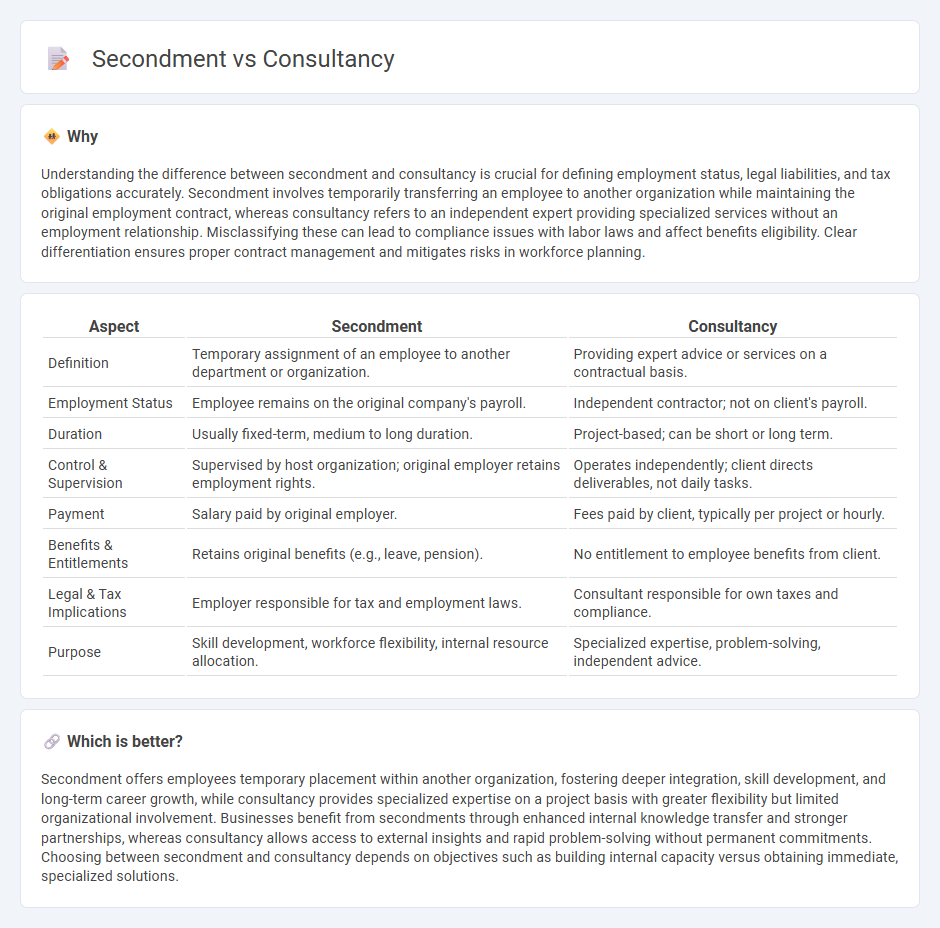
Secondment involves temporarily assigning an employee to work within a different department or organization, maintaining their original employment status and benefits. Consultancy refers to hiring external experts to provide specialized advice or services without transferring employment rights. Explore the key differences between secondment and consultancy to determine the best approach for your workforce needs.
Why it is important
Understanding the difference between secondment and consultancy is crucial for defining employment status, legal liabilities, and tax obligations accurately. Secondment involves temporarily transferring an employee to another organization while maintaining the original employment contract, whereas consultancy refers to an independent expert providing specialized services without an employment relationship. Misclassifying these can lead to compliance issues with labor laws and affect benefits eligibility. Clear differentiation ensures proper contract management and mitigates risks in workforce planning.
Comparison Table
| Aspect | Secondment | Consultancy |
|---|---|---|
| Definition | Temporary assignment of an employee to another department or organization. | Providing expert advice or services on a contractual basis. |
| Employment Status | Employee remains on the original company's payroll. | Independent contractor; not on client's payroll. |
| Duration | Usually fixed-term, medium to long duration. | Project-based; can be short or long term. |
| Control & Supervision | Supervised by host organization; original employer retains employment rights. | Operates independently; client directs deliverables, not daily tasks. |
| Payment | Salary paid by original employer. | Fees paid by client, typically per project or hourly. |
| Benefits & Entitlements | Retains original benefits (e.g., leave, pension). | No entitlement to employee benefits from client. |
| Legal & Tax Implications | Employer responsible for tax and employment laws. | Consultant responsible for own taxes and compliance. |
| Purpose | Skill development, workforce flexibility, internal resource allocation. | Specialized expertise, problem-solving, independent advice. |
Which is better?
Secondment offers employees temporary placement within another organization, fostering deeper integration, skill development, and long-term career growth, while consultancy provides specialized expertise on a project basis with greater flexibility but limited organizational involvement. Businesses benefit from secondments through enhanced internal knowledge transfer and stronger partnerships, whereas consultancy allows access to external insights and rapid problem-solving without permanent commitments. Choosing between secondment and consultancy depends on objectives such as building internal capacity versus obtaining immediate, specialized solutions.
Connection
Secondment and consultancy are connected through their roles in providing specialized expertise to organizations on a temporary basis. Both arrangements allow companies to access skilled professionals without long-term employment commitments, facilitating knowledge transfer and project-specific support. These flexible employment solutions optimize resource allocation and enhance organizational agility in dynamic business environments.
Key Terms
Contractual Relationship
Consultancy agreements establish a client-contractor relationship where the consultant retains autonomy and liability, while secondment involves an employee temporarily transferred under the control and supervision of the host company, maintaining employment ties with the original employer. Contractual nuances in consultancy emphasize project-based deliverables and independence, contrasting with secondment's integration into the host organization's daily operations and policies. Explore more to understand how these distinctions impact liability, control, and legal obligations.
Control and Supervision
Consultancy involves an external expert providing specialized advice without direct control or supervision from the hiring entity, maintaining independence in decision-making. Secondment entails temporarily transferring an employee to another organization where they operate under the host's direct control and supervision, aligning closely with internal operational practices. Explore the distinctions further to understand the implications for legal responsibility and workforce management.
Employment Status
Consultancy typically involves an independent contractor agreement where the consultant retains control over how work is performed, often resulting in a non-employee status for tax and legal purposes. Secondment assigns an employee temporarily to another organization while maintaining their original employment contract, ensuring continuous employee status and associated rights. Explore the key distinctions in employment status between consultancy and secondment for informed workforce decisions.
Source and External Links
What is consulting? | Consultancy.in - Consulting or consultancy involves providing independent, specialist advice and/or implementation support to organizations across industries, focusing mainly on business strategy, management, organization, operational processes, and technology.
What is consulting? - Consultancy.org - Consultancy firms offer expert, unbiased advice and solutions to clients' business dilemmas, often providing a knowledge advantage and cost-effective external capacity for managing change portfolios.
34 Types of Consulting Services to Offer Clients - Paperbell - Consultants specialize in areas like strategy, technology, or operations to solve specific business challenges by offering actionable solutions and tools rather than just teaching or coaching.
 dowidth.com
dowidth.com